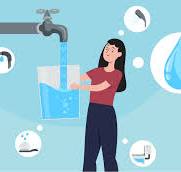The Importance of Saving Water
Water is a precious resource that is essential for all life on Earth. With the growing global population and increasing demands on water sources, it has become more important than ever to conserve this vital resource. Saving water not only helps to protect the environment but also ensures a sustainable future for generations to come.
Why Save Water?
Conserving water is crucial for several reasons:
- Environmental Preservation: By using water more efficiently, we can help preserve natural ecosystems and protect wildlife habitats.
- Resource Sustainability: Water is not an infinite resource. By saving water now, we ensure that there will be enough for future generations.
- Energy Conservation: Treating and transporting water requires energy. By using less water, we reduce the energy needed for these processes, leading to lower carbon emissions.
- Financial Savings: Conserving water can lead to lower utility bills, as well as reduced maintenance and repair costs for plumbing systems.
Tips for Saving Water
There are many simple ways to reduce water consumption in our daily lives:
- Fix Leaks: Repairing leaky faucets and pipes can save significant amounts of water.
- Use Efficient Appliances: Choose water-efficient appliances such as low-flow toilets and showerheads.
- Water Wisely: Water your garden early in the morning or late in the evening to minimise evaporation.
- Capture Rainwater: Install a rain barrel to collect rainwater for outdoor use instead of using treated drinking water.
- Avoid Wasting Water: Turn off taps while brushing teeth or washing dishes, and only run washing machines and dishwashers with full loads.
In conclusion, saving water is a responsibility that we all share. By making simple changes to our daily habits and adopting more sustainable practices, we can make a positive impact on the environment and ensure a secure water supply for future generations.
Top 6 Tips for Conserving Water at Home
- Turn off the tap while brushing your teeth.
- Take shorter showers to reduce water usage.
- Fix any leaks in taps or pipes promptly.
- Collect rainwater for watering plants or cleaning.
- Only run the dishwasher and washing machine when they are full.
- Use a broom instead of hosing down driveways and paths.
Turn off the tap while brushing your teeth.
Turning off the tap while brushing your teeth is a simple yet effective way to save water. By only using the water when needed, you can prevent unnecessary wastage and contribute to water conservation efforts. This small habit can make a significant difference in reducing water consumption over time, helping to preserve this precious resource for the future.
Take shorter showers to reduce water usage.
Taking shorter showers is a simple yet effective way to reduce water usage. By cutting down on shower time, we can significantly decrease the amount of water consumed during each shower session. This small adjustment in our daily routine not only helps conserve water but also contributes to lower energy bills and a more sustainable lifestyle.
Fix any leaks in taps or pipes promptly.
It is important to promptly fix any leaks in taps or pipes as they can waste a significant amount of water over time. Even a small drip can add up to litres of water lost each day, impacting both your water bill and the environment. By addressing leaks promptly, you not only conserve water but also prevent potential damage to your plumbing system. Regular maintenance and timely repairs can go a long way in saving this precious resource and promoting water efficiency in your home or workplace.
Collect rainwater for watering plants or cleaning.
Collecting rainwater is a simple yet effective way to save water and reduce our environmental impact. By using rainwater for watering plants or cleaning tasks, we can lessen our reliance on treated water sources and help conserve this precious resource. Not only does collecting rainwater help to lower water bills, but it also promotes sustainability by utilising a natural and abundant source of water that would otherwise go to waste.
Only run the dishwasher and washing machine when they are full.
Running the dishwasher and washing machine only when they are full is a simple yet effective way to save water. By waiting until these appliances are at full capacity, we can maximise their efficiency and reduce the number of cycles needed, ultimately conserving water. This small adjustment in our daily routine not only helps to lower water usage but also contributes to energy savings and a more sustainable approach to household chores.
Use a broom instead of hosing down driveways and paths.
Using a broom instead of hosing down driveways and paths is a simple yet effective way to save water. By sweeping away debris and dirt rather than using a hose, you can significantly reduce water wastage. This small change in habit not only conserves water but also helps to minimise unnecessary runoff and pollution. It’s a practical and eco-friendly approach that contributes to water conservation efforts and promotes sustainable living practices.
